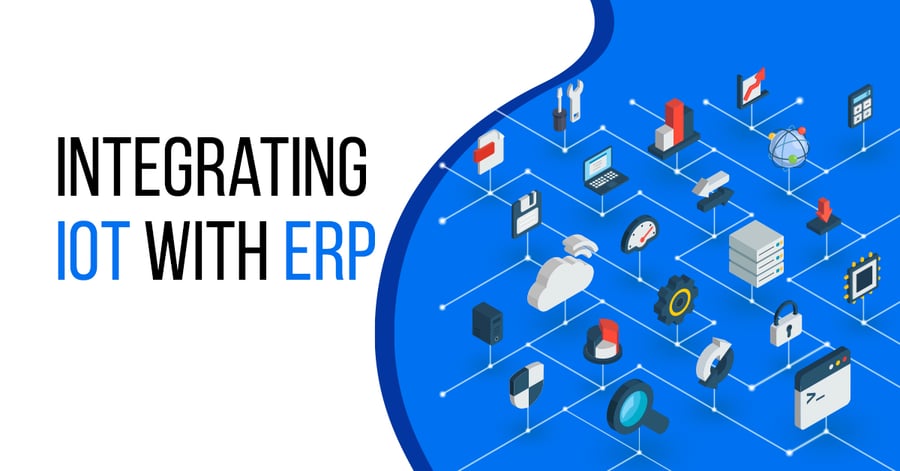

Recently, while browsing the internet, I came across an article on how image recognition along with transfer learning was used for automated Cassava disease detection in Tanzania and Africa. Not only was this a powerful method, but it also assured high accuracy. Phenomenal, isn’t it? It prompted me to pen down my thoughts on how ERP systems when integrated with IoT and machine learning capabilities can bring about a radical transformation in the world of predictive analysis, automation and artificial intelligence (AI). This, for ERP, would be a powerful method that would assure high accuracy.
ERP systems with integrated IoT platforms collect data from devices and processes, and analyses the data to learn continuously from it. Gradually, such an ERP system becomes indispensable in organizing the unstructured data from IoT and converting it into a more structured business data that can be used for machine learning and developing AI. There are several reasons why ERP systems need to be integrated with IoT. For instance, manufacturers need real-time information from work area, from shop floor to every other corner. This will be possible through ERP systems tightly knit with IoT.
Data that is generated from IoT is of high volume and is of high commercial value too. As per a report from an analytics firm, 16% of companies consume IoT data within ERP systems. Research firm IDC estimates that by 2020, 40% of all data will be machine-generated, with about 25 billion devices driving that growth. IoT and ERP solution integration is largely being implemented by automotive, healthcare and asset intensive industries. Data from IoT tied to ERP system can be used by these industries to track the Overall Equipment Efficiency (OEE) of their machines, identify bottlenecks in their business processes, and adjust their production schedules and other tasks.
For instance, to track the OEE, data from IoT with respect to availability, performance, and quality can be processed, analysed and shown in real-time by ERP systems. Machine learning capabilities in these ERP systems will be able to predict the best product to run on the production line, prioritize production operation for the best return, provide predictive accuracy, underline factors that impact product life, predict early detection of equipment failures, streamline production plan and manage several other functions. Data can also be used to simulate practices to improve the productivity of a machine and OEE of particular equipment.
Another instance would be stock replenishment in a supermarket or reordering of inventory in a warehouse based on the IoT input to the ERP system. On the shop floor, a Kanban signal can be sent from an IoT device to the ERP system and stock can be replenished. IoT sensors can track temperature controlled containers or reefers, detect anomalies in the machine operations and business processes, track inventory levels, warehouse operations, workforce movements etc. All these data can be processed by ERP applications to provide predictive analysis by machine learning algorithms.
Many organizations today are dealing with legacy or inflexible ERP applications that cause challenges in creating value in the world of digital disruption. Event driven and intelligent ERP Systems with IoT integration and RTI capabilities can automatically operationalize these IoT data within and outside the ERP application to bring in operational and executive efficiencies in organizations. Providing IoT based data to ERP applications with AI and ML capabilities will bridge the intelligence gap many companies face today.
This is the world of VUCA (volatility, uncertainty, complexity and ambiguity) and only Digital Transformation can combat it. It is time to embrace technology that is in front of you and that which can change the future of your organization.
Frequently Asked Questions (FAQs)
Enterprise asset management (EAM) involves the management of mission critical assets of an organization throughout each asset's lifecycle. EAM is used to plan, optimize, execute, and track the needed maintenance activities with the associated priorities, skills, materials, tools, and information. The aim is to optimize the quality and utilization of assets throughout their lifecycle, increase productive uptime and reduce operational costs.
Enterprise asset management (EAM) involves the management of the maintenance of physical assets of an organization throughout each asset's lifecycle. EAM is used to plan, optimize, execute, and track the needed maintenance activities with the associated priorities, skills, materials, tools, and information.
The software helps in effective maintenance of assets through preventive, predictive, shutdown and breakdown maintenance strategies. The system also helps enterprises mitigate equipment risks by enhanced safety standards. The streamlined operations and improved asset performance helps organizations increase their investment effectiveness.
EAM is important because it helps organizations track, assess, manage and optimize asset quality and reliability. Asset intensive Organizations have hundreds, thousands, even millions of assets which needs to be maintained to maximize / optimize life of these assets to increase the return on investment.
The key features of effective EAM are:
- Work management.
- Maintenance Strategies (Preventive/ Predictive / Breakdown / Shutdown).
- Planning and scheduling.
- Supply chain management.
- Health and safety.
- Mobility.
- Analytics.
- Improved Asset Health at reduced cost through data driven maintenance Programs
- Complete visibilityon entire maintenance data across Equipment, across Models, across Branches to aid in analysis & decision making such as to Repair or Replace the Equipment
- Insightful analysis of Inspection Data to improve customer satisfaction
- Effective maintenance management enhanced by predictive maintenance and inbuilt analytics
- Increased reliability and safety, keeps complete track of all the inspections & calibration schedules
- Mobile Application enables users to execute work while “in the field” leading to minimized non-productive time and increased productivity and reduces duplication of work and human errors in recording information.
- Quick turnaround time through Actionable Notification & Alerts for every process in real time and accessible anytime and anywhere.
- Improved Regulatory Part of asset management involves the implementation of better O&M practices, which can significantly improve compliance.
Asset Intensive companies under the following Industries :
- Ports
- Cement and Mining
- Utilities
- Fleet Maintenance
- Equipment Rental
- Other Manufacturing
- Real Estate & Infrastructure
- Power Generation
Contact us for a meeting and schedule a demo
This differs on case to case basis, based on the type of installation and unique industry specific requirements. Contact us for a meeting and schedule a demo.
This differs on case to case basis, based on the type of installation and unique industry specific requirements. Contact us for a meeting and schedule a demo.
Stay Connected, follow us on LinkedIn / Twitter to know more about EAM Software latest trends.


